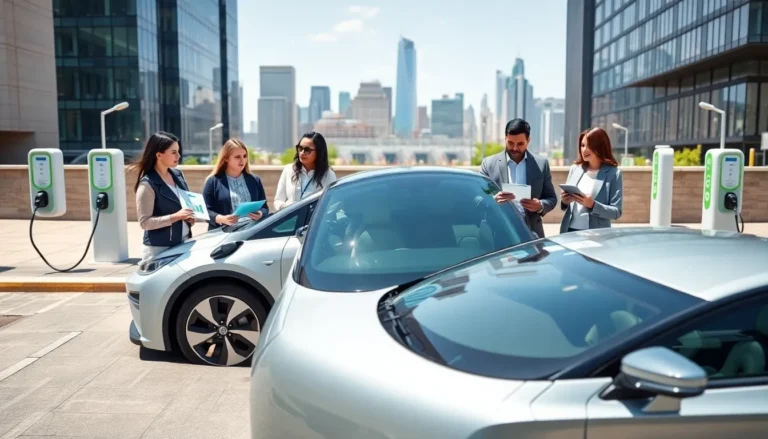Table of Contents
TogglePicture this: You’re whizzing past gas stations, your emissions-free ride silently gliding down the road, and the best part? You know it’s one of the most reliable electric vehicles on the market. Welcome to the world of EVs, where it’s not just about looking cool while saving the planet: you also want reliability. After all, nobody wants to break down at a charging station, right? Let’s jump into what makes some electric vehicles as dependable as your grandma’s extra set of keys.
Overview of Electric Vehicle Reliability

Electric vehicle reliability is a hot topic, especially as more drivers make the switch from traditional gas guzzlers to eco-friendly alternatives. The perception of electric vehicles, or EVs, has evolved significantly over the past decade. Initially, early models were often criticized for performance hiccups and battery life issues. But, modern EVs are rapidly becoming synonymous with reliability.
Manufacturers devote considerable resources to improve technology and engineering, ensuring that newer models offer both longevity and dependability. With advancements in battery technology and electronic components, today’s EVs are equipped to withstand the rigors of daily life, making them a smart choice for countless drivers.
Factors Influencing Electric Vehicle Reliability
Several factors contribute to the reliability of electric vehicles, setting them apart from their internal combustion counterparts. Firstly, the battery, which is the heart of any electric car, plays a crucial role. The development of lithium-ion batteries has vastly improved performance and life expectancy, with many warranties now extending to over 100,000 miles.
Another key factor is the simplicity of electric drivetrains. Without the myriad of moving parts found in a gas engine, think oil changes and exhaust systems, EVs often require less maintenance overall. Also, manufacturers’ focus on high-quality materials and robust construction adds another layer of reliability.
Software also influences reliability. Many EVs rely heavily on software for essential functions: regular updates enhance performance and efficiency, contributing to their overall reliability rating.
Top Reliable Electric Vehicles of 2025
As of 2025, several electric vehicles stand out for their remarkable reliability. Some of the top picks include:
- Tesla Model 3: This vehicle continues to dominate the market with its impressive technology and substantial range. Consumer reports frequently highlight its low incidence of issues.
- Toyota bZ4X: Known for its quality engineering, it combines Toyota’s legendary reliability with electric efficiency.
- Ford Mustang Mach-E: With rave reviews and a user-friendly interface, it proves to be a solid contender in the reliability race.
- Hyundai Kona Electric: Praised for its affordability and low maintenance costs, it offers a dependable option for both seasoned drivers and newcomers.
These vehicles aren’t just great for the environment: they also minimize the chances of unexpected visits to the repair shop.
Consumer Insights and Reviews
Consumer reviews are an essential metric for judging the reliability of electric vehicles. Most EV owners praise their vehicles for smooth rides and minimal maintenance issues. Surprising stories of long-distance travel without any breakdowns are quite common in EV forums.
Many drivers emphasize the psychological comfort that comes with adopting reliable models, knowing their vehicle is less likely to fail them. In fact, surveys have indicated that over 85% of EV owners feel satisfied with their purchase, particularly relating to reliability and low operational costs.
Some negative experiences do arise, particularly concerning charging infrastructure: but, these do not typically reflect a fault within the vehicles themselves but rather the growing pains of a transitioning energy network.
Comparison of Reliability Ratings and Warranties
Reliability ratings and warranties are crucial indicators for prospective buyers. Organizations such as J.D. Power and Consumer Reports provide comprehensive statistics on vehicle reliability. Tesla frequently ranks highly, as does Toyota, thanks to their historical commitment to quality.
Looking at warranties, most electric vehicle manufacturers offer compelling coverages, often including lengthy battery guarantees. For instance, many offer warranties stretching to eight years or 100,000 miles on the battery alone, ensuring peace of mind for drivers.
This focus on reliability is crucial: after all, the last thing an EV owner wants is battery anxiety. When choosing an electric vehicle, it’s wise to consider both the reliability ratings and the reliability of warranty support.
Future Trends in Electric Vehicle Reliability
Electric vehicle reliability is expected to improve even further as technology advances. Moving forward, innovations like solid-state batteries promise to enhance safety and longevity, so providing a boost in reliability. Besides, developments in artificial intelligence and machine learning will enable manufacturers to better predict potential issues before they arise, leading to proactive maintenance solutions.
As environmental regulations become more stringent and premium EV options emerge, it’s likely that reliability will continue to be a number one priority for manufacturers. Future EVs may not only become more reliable but possibly even smarter, integrating features that assist drivers in avoiding potential roadside issues.







